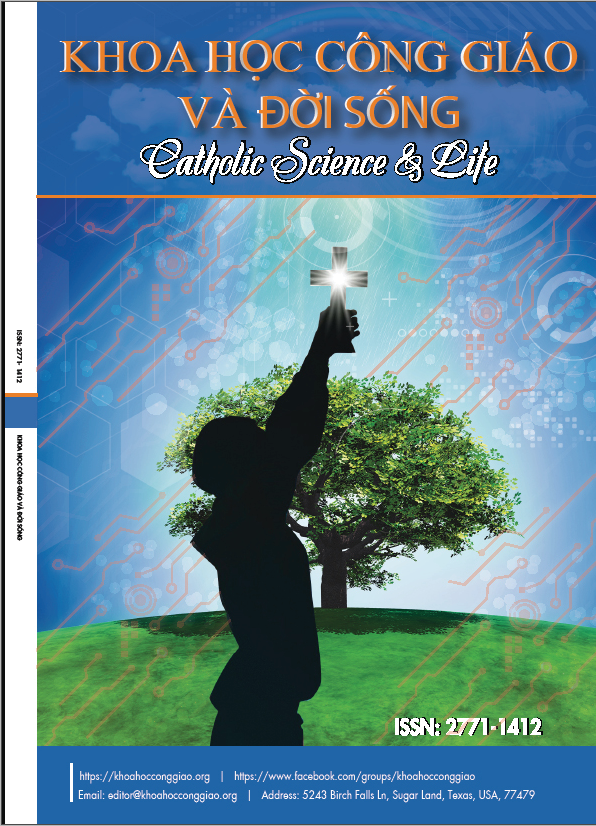Tại Sao Thiên Chúa Làm Người? - Theo Lối Giải Thích của Thánh Augustinô
Why Did God Become Human? - Based on the Explanation of Saint Augustine
DOI:
https://doi.org/10.54855/csl.23343Từ khóa:
thánh Augustin, Mầu nhiệm Nhập Thể, mầu nhiệm Con-Thiên-Chúa-làm-ngườiTóm tắt
Nhận định về thánh Augustinô, Altaner viết: “Vị giám mục vĩ đại đã kết hợp trong chính mình năng lượng sáng tạo của Tertullianô và chiều rộng tinh thần của Origen với sự nhạy cảm về giáo hội của Cyprianô; sự nhạy bén biện chứng của Aristotle với chủ nghĩa duy tâm và suy đoán bay bổng của Platon; ý thức thực tế của người Latinh với sự tinh tế về mặt tinh thần của người Hy Lạp. Ngài là triết gia vĩ đại nhất của thời giáo phụ. Không nghi ngờ gì nữa, Augustinô là thần học gia quan trọng nhất và có ảnh hưởng nhất đối với Giáo hội nói chung.”. Quả thực, điều đó đã được chứng minh cụ thể qua cách lý giải tuyệt vời của thánh Augusstinô về Mầu nhiệm Nhập Thể. Cùng với ngài, chúng ta chiêm ngắm mầu nhiệm Con-Thiên-Chúa-làm-người và trở nên Đấng Emmanuel, chúng ta cảm tạ Thiên Chúa, Đấng đã ban cho nhân loại Đức Kitô để giải thoát nhân trần khỏi tội lỗi và sự chết hầu dẫn chúng ta đưa đến sự sống vĩnh cửu của Thiên Chúa.
Abstract
In his assessment of Saint Augustine, Altaner writes: "The great bishop combined within himself the creative energy of Tertullian and the broad spiritual vision of Origen with the ecclesiastical sensitivity of Cyprian; Aristotle's sharp dialectics with the transcendental idealism and soaring speculations of Plato; the practical consciousness of the Latin with the spiritual refinement of the Greek. He is the greatest philosopher of the patristic era. Without a doubt, Augustine is the most important and influential theologian for the Church in general." Indeed, this has been specifically demonstrated through Saint Augustine's excellent explanation of the Mystery of the Incarnation. Alongside him, we contemplate the mystery of the Son of God becoming human and becoming Emmanuel. We express gratitude to God, who bestowed upon humanity the gift of Christ for the redemption of humanity from sin and death, leading us to the eternal life of God.
Tài liệu tham khảo
Kinh Thánh. Bản dịch của nhóm CGKPV. Hà Nội: Tôn giáo, 2011.
Augustinô. Tự Thuật. Vân Thúy dịch từ bản tiếng Pháp
của Louis de Mondadon. Hà Nội, Nxb: Tôn giáo, 2010.
Augustine. Eighty-three Different Questions. trans. David L. Moshier. Catholic University of America Press, 1982.
De catechizandis rudibus, trans. Salmon. Massachusette: Hendrich Publisher Marketing, 2012.
The exposition of Psalms, vol. 2, trans. Maria Boulding, O.S.B. New York: New City Press , 2000.
De Trinitate, trans. Arthur West Haddon D. B. Massachusette: Hendrich Publisher Marketing, 2012.
Enchiridion, trans. T. F. Shaw. Massachusette: Hendrich Publisher Marketing, 2012.
De haeresibus, trans. Patristic Studies. Washington: The Catholic University of America, 1956.
Letters, vol. 3, trans. Wilfrid Parsons. The Catholic University of America Press, 1953.
Altaner. Patrologia. Turin, 1976.
Brown, Peter. Augustine of Hippo. London and Berkeley: Faber and Faber/University of California Press, 1967
Gilson, Etienne. The Christian Philosophy of Saint Augustine. New York: Knopf, 1960.
Markus, Robert. Saeculum: History and Society in the Theology of Saint Augustine. Cambridge: Cambridge University Press, 1970
Portalie, Eugene. A Guide to the Thought of Saint Augustine. Chicago: Regnery, 1960.
TeSelle, Eugene. Augustine the Theologian.
New York: Herder, 1970
Trapè, Agostino. Saint Augustinus, in Patrology, Volume IV. Edicted by Angelo Di Beradino, with an introduction by Johannes Quasten. Translated into English by Rev. Placid Solari, O.S.B. Wesminster, Maryland. Christian Classis Inc., 1996.
Tải xuống
Đã Xuất bản
Cách trích dẫn
Số
Chuyên mục
Giấy phép
Bản quyền (c) 2023 Thiên Phú

Tác phẩm này được cấp phép theo Giấy phép quốc tế Creative Commons Attribution-NonCommercial 4.0 .
Authors retain copyright and grant the journal the right of first publication with the work simultaneously licensed under a Creative Commons Attribution 4.0 International License that allows others to share the work with an acknowledgment of the work's authorship and initial publication in this journal.
Authors are able to enter into separate, additional contractual arrangements for the non-exclusive distribution of the journal's published version of the work (e.g., post it to an institutional repository, in a journal or publish it in a book), with an acknowledgment of its initial publication in this journal.











